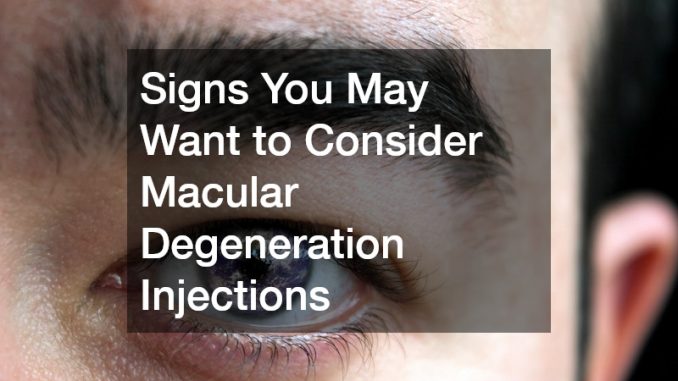

Macular degeneration is an eye condition that can significantly impact your daily life, as it affects your ability to see fine details, read, or recognise faces. If you are experiencing symptoms that disrupt your vision, it might be time to consider treatment options such as macular degeneration injections. These injections can help manage the progression of this condition, improve visual acuity, and enhance your overall quality of life.
One indicator that you might need to consider injections is noticing an increase in blurry or distorted vision when focusing on objects directly. This can make routine tasks challenging, thereby affecting your independence. Another concerning symptom is the formation of dark or empty spots in your central vision, which can hinder your ability to drive or perform work that requires attention to detail. Macular degeneration injections, such as anti-VEGF therapy, work by reducing abnormal blood vessel growth and stabilising vision loss.
If you find yourself struggling with a sudden decline in your night vision or colour perception, this might be another sign to talk to your eye care specialist about treatment options. Difficulty in adapting to low-light environments or distinguishing different hues can lead to frequent accidents and increased frustration. Discussing macular degeneration injections with your ophthalmologist can offer a viable plan to slow the condition’s progression and possibly improve your eyesight.
Another important sign to consider macular degeneration injections is if you start noticing straight lines appearing wavy or distorted. This phenomenon, known as metamorphopsia, is a common symptom of macular degeneration and can make everyday activities like reading, recognising faces, or watching television particularly difficult. If these distortions worsen over time, injections may be necessary to prevent further visual decline. These injections help target the abnormal blood vessel growth that is often responsible for such distortions, stabilising your vision and helping you manage these changes in perception.
Additionally, patients who have already been diagnosed with macular degeneration and notice their condition worsening may need to revisit their treatment plan. Even with initial treatment, the progression of the disease can vary between individuals, and symptoms can intensify. Regular monitoring through eye exams is essential for identifying these changes, and macular degeneration injections may be introduced as an effective measure for patients whose current treatments are no longer sufficient. If you have previously been managing with lifestyle changes, supplements, or other non-invasive therapies, injections can offer a more proactive way to maintain your vision and reduce the risk of further deterioration.
Frequent eye strain and headaches, particularly after attempting to focus on reading or detailed work, are also signs that your macular degeneration may be advancing. As the condition worsens, your eyes are forced to work harder to compensate for the loss of central vision. If you begin experiencing more frequent discomfort, it may be a good idea to consult your eye care provider. Injections can ease the strain by helping to preserve your central vision, thereby reducing the extra effort your eyes need to exert during daily tasks.
It is also worth considering macular degeneration injections if you have a family history of the condition and have begun experiencing early symptoms. While lifestyle adjustments like diet and protective measures against UV exposure can help, medical intervention in the form of injections can provide an extra layer of defence against rapid progression. By consulting with an eye care specialist early, you can stay ahead of the disease and potentially preserve your vision for longer.

For those hesitant about starting injections, it is important to weigh the benefits against any concerns. Modern advancements have made these injections a routine and minimally invasive procedure, usually requiring only a quick visit to the ophthalmologist. The benefits of preventing further vision loss and, in some cases, improving sight, often outweigh the temporary inconvenience of regular treatment.
While macular degeneration may seem initially intimidating, there are multiple ways to manage its symptoms effectively with modern treatments. By staying observant to changes in your vision and consulting with qualified healthcare professionals, you can address concerns early and maintain a high quality of life. Consider macular degeneration injections as a potential avenue for treatment, and take proactive steps to protect your vision today!